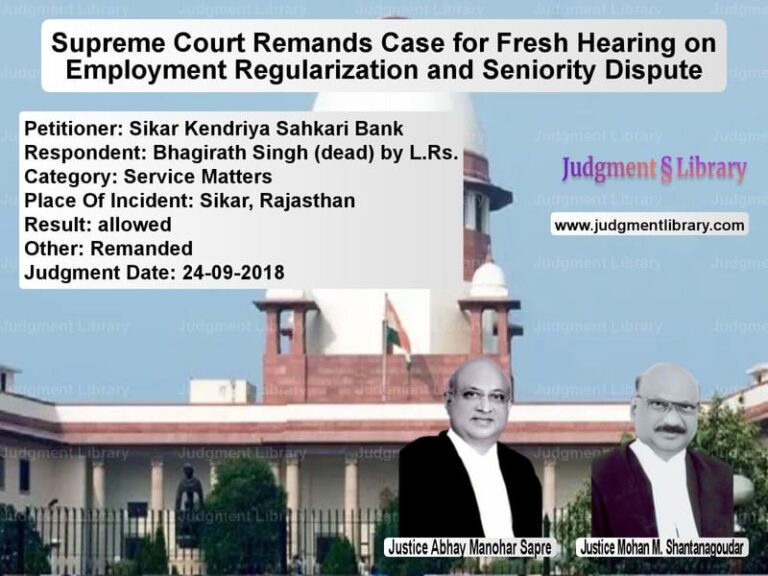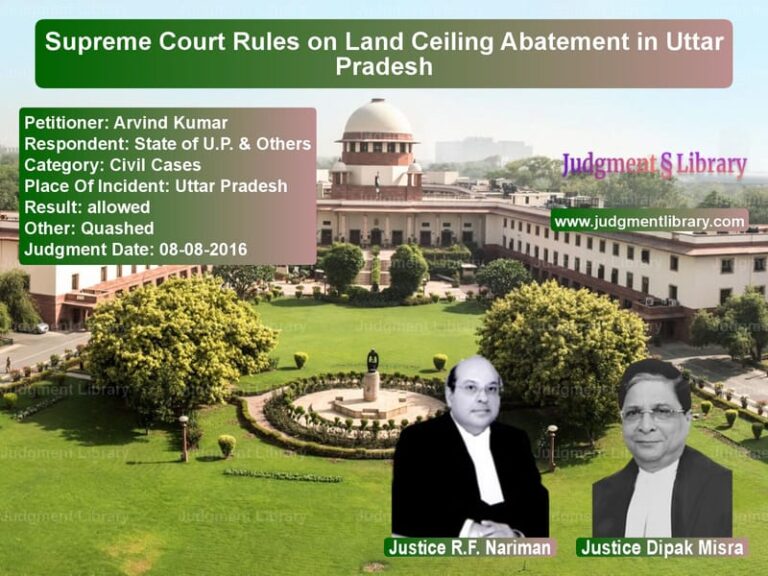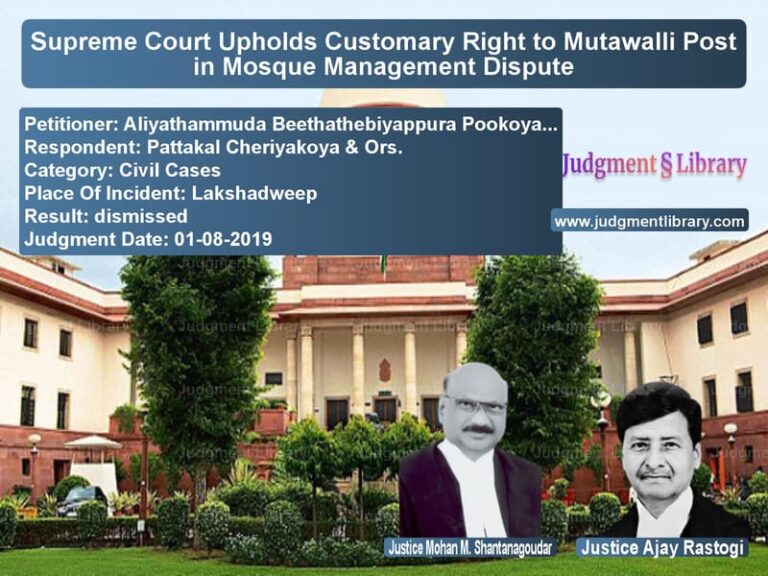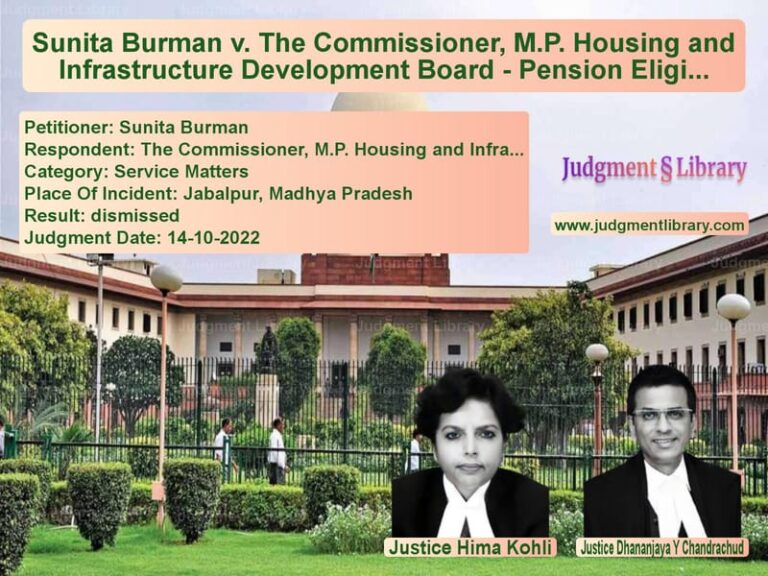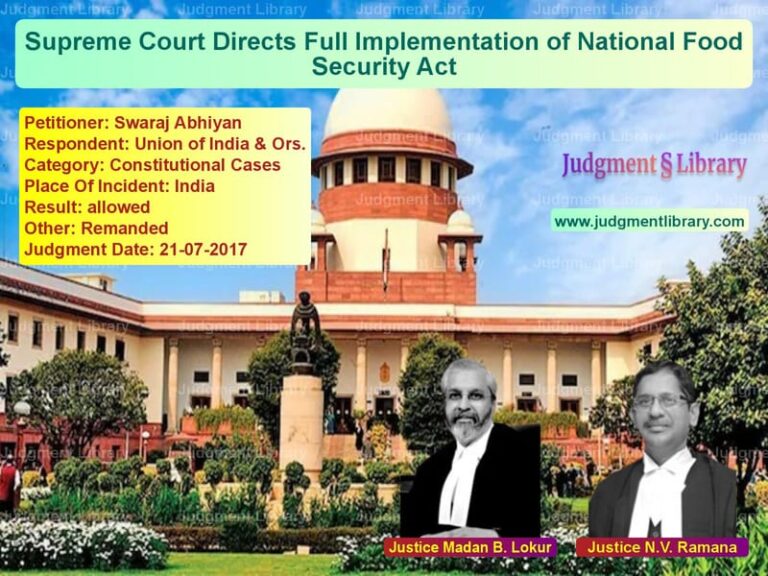Supreme Court Rules on Minority Institution’s Right to Government Aid for Extended Service of Principal
The Supreme Court of India, in the case of The State of Gujarat & Others vs. H.B. Kapadia Education Trust & Another, examined whether a government-aided minority institution had the right to receive financial aid for the extended tenure of a principal beyond the retirement age specified under the state’s Grant-in-Aid Code. The judgment clarified that while minority institutions enjoy autonomy in administration under Article 30(1) of the Constitution, they are still bound by government regulations when receiving state aid.
Background of the Case
The case revolved around The New High School, run by the H.B. Kapadia Education Trust, a Jain minority institution. The principal, Mr. H.H. Kapadia, reached the retirement age of 58 years on July 22, 1999. The institution sought permission from the state government to extend his service. The District Education Officer (DEO) granted permission for an extension until the age of 60, with the condition that the school would bear the salary expenses.
Subsequently, the institution sought further extension of Mr. Kapadia’s tenure beyond 60 years, which was denied by the DEO. The institution challenged this decision in the Gujarat High Court, arguing that the refusal violated Article 30(1) of the Constitution, which grants minority institutions the right to administer their institutions independently.
The Single Judge Bench of the Gujarat High Court ruled in favor of the institution, holding that the government’s decision to stop financial aid for Mr. Kapadia’s salary was unconstitutional. The state was directed to pay arrears of grant from 2001 to 2012. The Division Bench upheld this ruling, prompting the State of Gujarat to appeal before the Supreme Court.
Arguments by the Appellants (State of Gujarat & Others)
- The state contended that the Grant-in-Aid Code clearly stipulated 58 years as the retirement age for teachers in government-aided secondary schools, with an extension permitted only up to 60 years.
- The minority institution had autonomy in deciding employment terms but could not demand government funds for employment beyond the prescribed age limit.
- The state argued that financial aid must be subject to uniform application of rules and that granting aid beyond the stipulated retirement age would set a precedent for all institutions to demand similar exceptions.
- Reliance was placed on previous Supreme Court judgments, including T.M.A. Pai Foundation vs. State of Karnataka, which held that while minority institutions have autonomy, they must comply with state regulations when availing government aid.
Arguments by the Respondents (H.B. Kapadia Education Trust)
- The institution argued that denying financial aid for Mr. Kapadia’s extended tenure violated Article 30(1), which guarantees minority institutions the right to manage their affairs without state interference.
- They contended that since the state had granted an extension for two years without aid, there was no legal basis to deny further extension with financial support.
- The respondents emphasized that the denial of grant amounted to discrimination against a minority institution and violated Article 30(2), which prohibits the state from discriminating against minority institutions in grant disbursal.
- The school had continued to function as a recognized institution and was entitled to government aid like any other aided institution.
Supreme Court’s Analysis and Judgment
The Supreme Court analyzed the provisions of the Gujarat Secondary Education Act, 1972, the Secondary Education Regulations, 1974, and the Grant-in-Aid Code. The key observations were:
- Regulations Override Grant-in-Aid Code: The Court noted that as per Regulation 42, the provisions of the Regulations prevailed over those in the Grant-in-Aid Code.
- Autonomy Does Not Extend to Financial Aid: While minority institutions have the right to administer their affairs, they cannot claim government aid as an absolute right.
- Retirement Age Enforced Uniformly: The Court ruled that the institution could not extend the principal’s tenure beyond the prescribed retirement age and expect government aid.
- Non-Discrimination in Grant Disbursal: The Court rejected the argument that the denial of funds was discriminatory, holding that the same rules applied to all government-aided institutions, regardless of their minority status.
The Court referred to its judgment in State of Uttar Pradesh vs. Principal Abhay Nandan Inter College, which emphasized that institutions receiving government aid must comply with applicable rules and conditions.
Read also: https://judgmentlibrary.com/judicial-review-in-high-court-judge-appointments-supreme-courts-verdict/
The Court stated:
“The right under Article 30(1) is not an absolute right above the law, and the provisions for the grant or non-grant in aid to educational institutions, whether it is majority-run or minority-run, have to be uniformly applied.”
Final Verdict
- The Supreme Court set aside the Gujarat High Court’s ruling.
- It upheld the state’s decision to deny financial aid for the extended tenure of the principal beyond 60 years.
- The judgment reinforced that minority institutions receiving government aid must adhere to state regulations regarding employment and financial assistance.
This judgment serves as a precedent in clarifying that while minority institutions have autonomy, they cannot demand government financial aid for decisions that go beyond the prescribed regulations. The ruling balances the rights of minority institutions with the state’s authority to regulate financial aid distribution in an equitable manner.
Petitioner Name: State of Gujarat & Others.Respondent Name: H.B. Kapadia Education Trust & Another.Judgment By: Justice Dinesh Maheshwari, Justice Bela M. Trivedi.Place Of Incident: Gujarat.Judgment Date: 20-02-2023.
Don’t miss out on the full details! Download the complete judgment in PDF format below and gain valuable insights instantly!
Download Judgment: state-of-gujarat-&-o-vs-h.b.-kapadia-educati-supreme-court-of-india-judgment-dated-20-02-2023.pdf
Directly Download Judgment: Directly download this Judgment
See all petitions in Fundamental Rights
See all petitions in Public Interest Litigation
See all petitions in Judgment by Dinesh Maheshwari
See all petitions in Judgment by Bela M. Trivedi
See all petitions in allowed
See all petitions in Quashed
See all petitions in supreme court of India judgments February 2023
See all petitions in 2023 judgments
See all posts in Constitutional Cases Category
See all allowed petitions in Constitutional Cases Category
See all Dismissed petitions in Constitutional Cases Category
See all partially allowed petitions in Constitutional Cases Category



